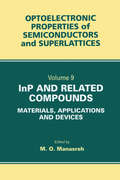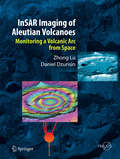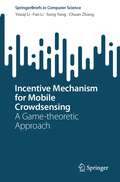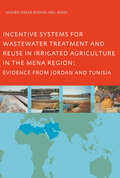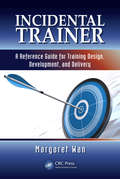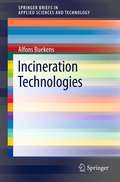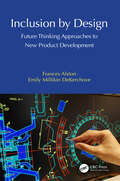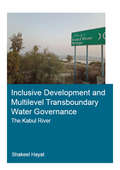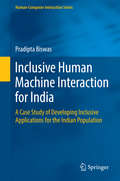- Table View
- List View
InP and Related Compounds: Materials, Applications and Devices
by M. O. ManasrehInP is a key semiconductor for the production of optoelectronic and photonic devices. Its related compounds, such as InGaAsP alloy, have been realized as very important materials for communication in the 1.3 and 1.55 micron spectral regions. Furthermore, the applications on InP and related compounds have extended to other areas that include laser d
InSAR Imaging of Aleutian Volcanoes
by Zhong Lu Daniel DzurisinInterferometric synthetic aperture radar (InSAR) is a relatively new remote sensing tool that is capable of measuring ground-surface deformation with centimeter-to-subcentimeter precision at a spatial resolution of tens of meters over an area of hundreds to thousands of square kilometers. With its global coverage and all-weather imaging capability, InSAR has become an increasingly important technique for studying volcanoes in remote regions such as the Aleutian Islands. The spatial distribution of surface deformation data derived from InSAR images enables the construction of detailed mechanical models to enhance the study of magmatic processes. InSAR Imaging of Aleutian Volcanoes: * Provides a theoretical framework for InSAR observations and capabilities * Discusses state-of-the-art InSAR analysis techniques * Describes the structure, eruptive history, and magma composition of volcanoes along the entire Aleutian arc * Presents conceptual models for the magma plumbing systems of Aleutian volcanoes based on InSAR results combined with geophysical, geological and geochemical observations. * Synthesizes observations of deformation along the Aleutian arc and compares those results to other active arcs around the world. * Is illustrated throughout with high-resolution color satellite radar images
Inadvertent Escalation
by Barry R. PosenIn this sobering book, Barry R. Posen demonstrates how the interplay between conventional military operations and nuclear forces could, in conflicts among states armed with both conventional and nuclear weaponry, inadvertently produce pressures for nuclear escalation. Knowledge of these hidden pressures, he believes, may help some future decision maker avoid catastrophe. Building a formidable argument that moves with cumulative force, he details the way in which escalation could occur not by mindless accident, or by deliberate preference for nuclear escalation, but rather as a natural accompaniment of land, naval, or air warfare at the conventional level. Posen bases his analysis on an empirical study of the east-west military competition in Europe during the 1980s, using a conceptual framework drawn from international relations theory, organization theory, and strategic theory. The lessons of his book, however, go well beyond the east-west competition. Since his observations are relevant to all military competitions between states armed with both conventional and nuclear weaponry, his book speaks to some of the problems that attend the proliferation of nuclear weapons in longstanding regional conflicts. Optimism that small and medium nuclear powers can easily achieve "stable" nuclear balances is, he believes, unwarranted.
Inadvertent Images: A History of Photographic Apparitions
by Peter GeimerAs an artistic medium, photography is uniquely subject to accidents, or disruptions, that can occur in the making of an artwork. Though rarely considered seriously, those accidents can offer fascinating insights about the nature of the medium and how it works. With Inadvertent Images, Peter Geimer explores all kinds of photographic irritation from throughout the history of the medium, as well as accidental images that occur through photo-like means, such as the image of Christ on the Shroud of Turin, brought into high resolution through photography. Geimer’s investigations complement the history of photographic images by cataloging a corresponding history of their symptoms, their precarious visibility, and the disruptions threatened by image noise. Interwoven with the familiar history of photography is a secret history of photographic artifacts, spots, and hazes that historians have typically dismissed as “spurious phenomena,” “parasites,” or “enemies of the photographer.” With such photographs, it is virtually impossible to tell where a “picture” has been disrupted—where the representation ends and the image noise begins. We must, Geimer argues, seek to keep both in sight: the technical making and the necessary unpredictability of what is made, the intentional and the accidental aspects, representation and its potential disruption.
Inca
by Farah Rizvi Lawrence KovacsRevealing legends and legacies, Inca: Discover the Culture and Geography of a Lost Civilization with 25 Projects offers engaging insight into the continent-sprawling ancient Inca culture. The text and activities invite learners on a journey along the Inca Trail. They'll visit the city of Cuzco and the majestic Machu Picchu, built on a jagged ridge thousands of feet above the Urubamba River. Kids will learn about cultural beliefs, rituals, scientific advances, and languages. They'll create Salar de Uyuni salt crystals and build a tropical cloud forest. This captivating educational tool also features unique illustrations, informative sidebars, fun-fact questions, and vocabulary that will interest readers from start to finish.
Incentive Mechanism for Mobile Crowdsensing: A Game-theoretic Approach (SpringerBriefs in Computer Science)
by Song Yang Fan Li Chuan Zhang Youqi LiMobile crowdsensing (MCS) is emerging as a novel sensing paradigm in the Internet of Things (IoTs) due to the proliferation of smart devices (e.g., smartphones, wearable devices) in people’s daily lives. These ubiquitous devices provide an opportunity to harness the wisdom of crowds by recruiting mobile users to collectively perform sensing tasks, which largely collect data about a wide range of human activities and the surrounding environment. However, users suffer from resource consumption such as battery, processing power, and storage, which discourages users’ participation. To ensure the participation rate, it is necessary to employ an incentive mechanism to compensate users’ costs such that users are willing to take part in crowdsensing. This book sheds light on the design of incentive mechanisms for MCS in the context of game theory. Particularly, this book presents several game-theoretic models for MCS in different scenarios. In Chapter 1, the authors present an overview of MCS and state the significance of incentive mechanism for MCS. Then, in Chapter 2, 3, 4, and 5, the authors propose a long-term incentive mechanism, a fair incentive mechanism, a collaborative incentive mechanism, and a coopetition-aware incentive mechanism for MCS, respectively. Finally, Chapter 6 summarizes this book and point out the future directions. This book is of particular interest to the readers and researchers in the field of IoT research, especially in the interdisciplinary field of network economics and IoT.
Incentive Systems for Wastewater Treatment and Reuse in Irrigated Agriculture in the MENA Region, Evidence from Jordan and Tunisia
by Maher Omar Abu-MadiIn the countries of the Middle East and Northern Africa, reclaimed wastewater is recognized as a non-conventional water resource. However, substandial amounts are still discharged into water courses without further treatment. The objective of this research was to analyse the technological, regulatory, institutional, financial and
Inch by Inch: Book Two Step by Step (Step by Step #2)
by Morgan LlywelynBestselling author Morgan Llywelyn continues her near-future, apocalyptic thriller trilogy with her signature depth and intimacy of character. In Inch by Inch, book two in the trilogy, the residents of Sycamore River have only just adjusted to the end of the Change. Until the morning people notice that metal starts to behave oddly.It's dissolving.The world is pushed into global war, and a small band of Sycamore River survivors only have one another. They have to survive the unthinkable.Step by StepDrop by DropAt the Publisher's request, this title is being sold without Digital Rights Management Software (DRM) applied.
Incident Investigation and Accident Prevention in the Process and Allied Industries
by Nigel HyattTo prevent future accidents, a complete examination of the causes and contributory factors of an accident is necessary. Stressing the need to correct these issues, Incident Investigation and Accident Prevention in the Process and Allied Industries strikes a balance between the theoretical and applied aspects of accident investigation while also addressing accident prevention.Based on the authors forty years of experience, this detailed work covers an extensive range of topics often encountered during an incident investigation. Since the scope and needs of investigations can widely vary, the author begins with an introduction that provides guidance on how to use the book. He supplies a "roadmap" of incident investigation, making the material accessible to novices yet also valuable to more seasoned investigators.Topics include:Responding to occurrence of incidents and emergency response Securing the site and handling eyewitness testimonies Notification of appropriate authorities, compliance requirements, and legal and insurance issues Internal/external incident investigation options and investigation team requirements Disassembly, gathering, screening, tagging, storing of evidence, and post-incident testing Establishing preliminary causal mechanisms and root cause determinations Multiple cause determination, incident modeling, and human error evaluation and reporting Remedial and preventative measures, lessons learned, and reconstruction and retraining Accident prevention through predictive methodologies, including pro-active measures Pre- and post-incident management Corporate structuring, attitudinal problems, and planning an accident prevention program
Incidental Trainer: A Reference Guide for Training Design, Development, and Delivery
by Margaret Wan"We have trained and trained. The employees still don't get it!" Although a critical component in improving organizational performance, training is usually not conducted effectively and results in a waste of resources. Often, subject-matter experts are given training responsibilities because of their technical expertise; however, just as often, the
Incidents That Define Process Safety, 1st Edition
by CcpsIncidents That Define Process Safety describes approximately fifty incidents that have had a significant impact on the chemical and refining industries' approaches to modern process safety. Events are described in detail so readers get a fundamental understanding of the root causes, the consequences, the lessons learned, and actions that can prevent a recurrence. There are exhaustive investigative reports about these events, allowing you to apply the resulting safety principles to their current operations.
Incinerating Biosolids
by Frank R. SpellmanAbout the BookManaging biosolids for reuse and not for disposal is the focus of this book. The emphasis is placed on environmental compliance where the goal is the processing of treated biosolids to the production of a waste product (biosolids ash) that has been discarded in the past and to demonstrate that this particular waste byproduct has some value. When biosolids ash is managed for reuse and is not disposed of in the traditional manner, all sides win, including the environment.
Incineration Technologies
by Alfons BuekensWaste incineration is the art of completely combusting waste, while maintaining or reducing emission levels below current emission standards. Where possible, objectives include the recovering of energy as well as the combustion residues. Successful waste incineration makes it possible to achieve a deep reduction in waste volume, obtain a compact and sterile residue, and eliminate a wide array of pollutants. This book places waste incineration within the wider context of waste management, and demonstrates that, in contrast to landfills and composting, waste incineration can eliminate objectionable and hazardous properties such as flammability and toxicity, result in a significant reduction in volume, and destroy gaseous and liquid waste streams leaving little or no residues beyond those linked to flue gas neutralization and treatment. Moreover, waste incineration sterilizes and destroys putrescible matter, and produces usable heat. Incineration Technologies first appeared as a peer-reviewed contribution to the Encyclopedia of Sustainability Science and Technology. It provides detailed treatment of the challenges of this technically complex process, which requires huge investment and operating costs, as well as good technical skills in maintenance and plant operation. Particular attention is paid to technologies for ensuring the complete burn-out of flue gas and residues and for controlling the resulting pollutants.
Inclined Planes and Wedges
by Sally M. Walker Andy King Roseann FeldmannFocusing on the six simple machines--levers, wheels and axles, pulleys, screws, inclined planes, and wedges--this fun and informative series introduces young readers to several basic concepts of physics--such as work, force, gravity, and friction. It includes easy-to-do experiments, clear text, and fun activities. It supports the national science education standards Unifying Concepts and Processes: Evidence, Models, and Explanation; Unifying Concepts and Processes: Form and Function; Science as Inquiry; Physical Science; and Science and Technology as outlined by the National Academics of Science and endorsed by the National Science Teachers Association. Image descriptions present.
Inclusion Bodies: Methods and Protocols (Methods in Molecular Biology #2617)
by Julian Kopp Oliver SpadiutThis detailed volume presents a series of protocols dealing with different aspects of inclusion body (IB) processing, from cloning procedures to purification of refolded product. Commencing with chapters on upstream processing, looking into different expression strategies for IB production, the book continues with downstream applications, highlighting early protein purification and subsequent analytics, as well as success stories of IB-based processes. Written for the highly successful Methods in Molecular Biology series, chapters include introductions to their respective topics, lists of the necessary materials and reagents, step-by-step and readily reproducible laboratory protocols, and tips on troubleshooting and avoiding known pitfalls. Authoritative and practical, Inclusion Bodies: Methods and Protocols serves as an ideal resource for facilitating diverse aspects of IB processing.
Inclusion Polymers
by Gerhard WenzThis book contains short and concise reports on physics and chemistry of polymers, each written by the world renowned experts. The book has the highest Impact Factor of all journals ranked by ISI within Polymer Science.
Inclusion by Design: Future Thinking Approaches to New Product Development
by Frances Alston Emily Millikin DeKerchoveThis book introduces a new speculative design process for inclusive new product development (NPD). The authors offer Vision Enabled Design Thinking (VEDT), a human-centered technological design framework incorporating the use of Design Lens and Vision Concepting, as a way for the designer to ideate and reflect on product development concepts within a deeper sociocultural context. The authors incorporate project management concepts into the overall design process through the development of a new design process, "4-D Algorithm for New Product Development".Inclusion by Design: Future Thinking Approaches to New Product Development formalizes the use of speculative design as a means for more inclusive NPD and promotes management of the design process as a needed skill for future engineers and designers. It provides a novel design methodology of VEDT for engaging vision concepting, through the use of Design Lenses in engaging speculative design practices and offers an implementation framework to support the sustainable adoption and use of future design methods. The 4-D Algorithm for New Product Development promotes inclusivity in design while addressing practical aspects of managing the design process in today’s corporate business environment.Those involved with interactive product and technology design, new product development, design researchers and managers, engineers, as well as professionals and graduate students will find this book useful.
Inclusive Access and Open Educational Resources E-text Programs in Higher Education
by Tracy A. HurleyThis volume takes a comprehensive and broad look at e-text programs across a wide spectrum of programs, institutions, and policies in three parts. The first part showcases several policy papers to contextualize the discussion and highlight the reasons for IAE programs’ structure and the obstacles they face for implementation. The second part is an in-depth exploration of various case studies that provide a detailed description of IAE programs, including information about program elements, program structure, program size, and insights into how programs are operationalized, and their shortcomings and benefits to students and stakeholders. The final part is a selection of research papers that offer evidence-based support for the adoption of IAE programs in terms of student success, access, engagement, costs, and a variety of other student and institutional outcomes. There are approximately 300 institutions of higher education that currently have some form of Inclusive Access or Open Educational Resources E-text (IAE) program in the United States, but there is little scholarship that engages on the topic of assessing these programs’ effect on student success. The results of the research studies included in this volume will inform faculty, administrators, and policy-makers who seek to support the development, adoption, and implementation of IAE programs based on their potential positive effects on student success and other outcomes.
Inclusive By Design: Crafting Products and Services for a More Equitable World
by Mathieu AguesseDiscover how to incorporate DEI principles into your everyday life and environment In Inclusive By Design: Crafting Products and Services for a More Equitable World, diversity, equity, and inclusion (DEI) strategist and designer Mathieu Aguesse delivers a powerful and practical new playbook for equitable design. He walks you through the concepts and practices that will help you integrate your DEI goals into your community and workplace. You'll learn about the principles that undergird inclusive design, how to apply them in real-world scenarios—from the drawing room to the classroom and boardroom—and how to advocate for systemic change within your environment. You'll also discover: Engaging case studies that span a wide range of sectors and demographics Actionable insights and methodologies tailored to help you apply the concepts discussed in the book Strategies for intentional design that can influence, enhance, and benefit society by implementing DEI principles into everyday practices Perfect for design professionals, educators, strategists, and corporate and business leaders seeking realistic techniques for incorporating DEI into the real-world, Inclusive By Design is also an essential read for DEI professionals looking for on-the-ground guidance on how to improve the world around them.
Inclusive Design Guidelines for HCI
by Julio Abascal Collette NicolleThe elderly population is growing and disabilities tend to increase with age. Professionals in the field of human-computer interaction (HCI) are becoming increasingly aware of the needs of the elderly and people with disabilities. They also need to ensure that systems are designed for all, with specific consideration of these groups, not only computing systems but also other assistive and adaptive technologies such as information services and the use of smart cards, assistive robotics, systems for travellers, and home and environmental control systems. Designers need to monitor the latest developments in the design of HCI and to appreciate their impact on accessibility and usability.
Inclusive Design and Accessibility Paradigms in Lebanon: University Built Environments Case Studies
by Itab ShuaybThis book describes the disability rights movement that started in the USA and its influence on the disability rights movement in Lebanon, which has led to the endorsement of the Lebanese Disability Act 220/2000. The book introduces the reader to the Lebanese Disability Act 220/ 2000, its definition of disability, and its relation to the medical and social models of disabilities and then articulate the Act articles. Then, it defines the inclusive design paradigm that acknowledges the needs of all people at each stage of their life cycle and presents the difference between inclusive design and accessibility and disability notions. Moreover, the book reviews the different international accessible design standards (American and French) that are adopted in Lebanon with the absence of a nationalized Lebanese design standard and its effect on eliminating barriers and enhancing accessibility at university buildings. Besides, the book presents students' experiences and their satisfaction with the university built environments. 6 university buildings case studies at the American University of Beirut are assessed and analysed to check whether they adopt the inclusive design approach and then propose inclusive design solutions for both heritage and modern university buildings. What makes the book unique is its combination of empirical and theoretical application of inclusive design. The last section, reflects the author’s inclusive design teaching pedagogy. In this section, the author shares samples of students’ class design project and provides recommendations and guidelines for teaching inclusive design so it becomes mainstream.
Inclusive Design of a Smart Device for People with Parkinson’s Disease (Design For Inclusion #4)
by Silvia ImbesiThis book reports on an inclusive design project aimed at developing IoT-based wearable devices for special populations. Specifically, it covers the design, the implementation and testing of a smart mHealth system that uses sensory cues to monitor and train the gait and posture of people with Parkinson’s disease. It presents a user-centred strategy to better involve the users in defining the most suitable type of sensory cues and their combination, and in the design of the user interface, at the purpose of developing a gait tutoring system that better fits users’ needs and requirements. All in all, this book offers extensive information on the state-of-the-art in the design and testing of innovative user-centred mHealth systems. Giving a particular attention to the explanation of the tools and methodological choices, it provides readers with a timely reference guide to understand and deal with complex inclusive design projects.
Inclusive Development and Multilevel Transboundary Water Governance - The Kabul River (IHE Delft PhD Thesis Series)
by Shakeel HayatThe four decades long ideological-based insurgencies and conflict in the Kabul River Basin (KRB) have seriously hampered the relations and foreign policies of both Afghanistan and Pakistan. Consequently, it restricts them to solve various bilateral issues including transboundary waters. This lack of cooperation over shared water resources is one of the barriers to achieve inclusive and sustainable development. Additionally, it has contributed to the prevailing anarchic situation where each country does what it wants. The absence of a formal water-sharing mechanism coupled with poor water management practices within both the riparian counties are resulting various flow and administration-related challenges. Moreover, these challenges are further exacerbated by regional changes in social, political, environmental and economic systems. The scholarly literature suggests that an analytical transboundary water governance framework is essential to address the challenges of water politicisation and securitisation, quality degradation and quantity reduction. Additionally, the literature rarely integrates (a) a multi-level approach, (b) an institutional approach (c) an inclusive development approach, or (d) accounts for the uses of different types of water and their varied ecosystem services for improved transboundary water governance. To enhance human wellbeing and achieve inclusive and sustainable development in the KRB this research indicates that it is essential to: (1) defrost frozen collaboration; (2) bypass border dispute; (3) use biodiversity and ecosystem services approach; (4) address existing and potential natural and anthropogenic challenges; (5) remove contradictions in the policy environment; (6) combat resource limits and dependence by promoting collaboration on long-term cost effective solutions; and (7) enhance knowledge and dialogue on inclusive development.
Inclusive Environments and Access to Commercial Property
by Adrian TaggThis book presents and examines the challenges and compromises required to deliver inclusivity in the existing commercial-built environment and the socio-economic benefits that could result from successfully delivering it.To illuminate the advantages of an inclusive environment to property owners, investors and service providers, the book covers the history of disability and evolution of the legislation and examines the demographics and types of disability to question the ‘one size’ ‘blanket’ approach that currently exists to providing access. Delving further into the characteristics of the commercial property sectors and individual disability-specific requirements, experienced commercial building surveyor, Adrian Tagg, analyses the contradictions in the existing legislation to establish examples of design compromise or reasonable adjustments. He seeks to contextualise public and commercial attitudes to disability and go further to demystify the term ‘reasonable adjustment’, which is used currently as a tool of compromise in providing access. The aim is to assess disability-specific requirements for access, as well as adopt a simplistic approach to developing access solutions to the existing built environment from a consultancy and user perspective.Ultimately, this publication hopes to promote accessibility and inclusion from the perspective of surveyors, investors and landlords working in commercial property. It is not just targeted at those on undergraduate or post-graduate surveying courses, as well as those early career professionals undertaking their APC or post-graduate qualifications, but also at those owning or delivering goods, services and employment from commercial premises who want to make a difference.
Inclusive Human Machine Interaction for India
by Pradipta BiswasRapid advancement of interactive technologies during the past two decades has made access to information easier though at the expense of a clear digital divide. There is a generation who grew up with these technologies and another generation who find many modern electronic systems counter intuitive and have no use for them in their daily life. This digital divide becomes more prominent in developing countries as state-of-the-art interactive systems were not and are still not affordable to a large number of users. Inclusive Human Machine Interaction for India presents an end-to-end case study of developing interactive technology for the common people of India. With a foreword from Prof Ashok Juhunjhunwala (Professor, Indian Institute of Technology Madras), this book investigates problems of middle-aged and elderly users in adopting interactive technologies and proposes new user interfaces and interaction techniques. It pioneers in introducing state-of-the-art eye-gaze tracking based interaction to everyday computing tasks and presents a detailed literature survey and user studies on user modelling and eye-gaze tracking. Technologies presented in this book will not only be relevant for developing countries but will also find useful applications in developed countries.
